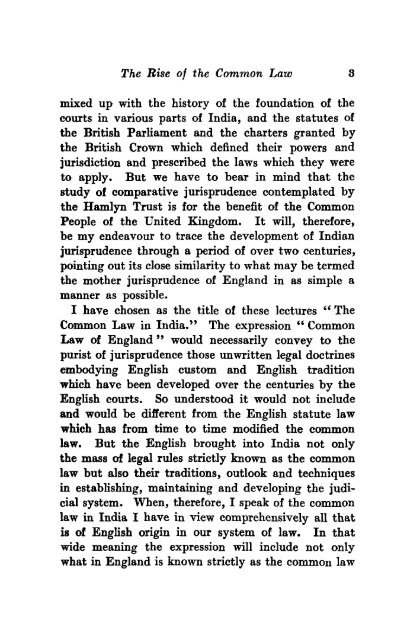The Common Law in India - College of Social Sciences and ...
The Common Law in India - College of Social Sciences and ...
The Common Law in India - College of Social Sciences and ...
- No tags were found...
Create successful ePaper yourself
Turn your PDF publications into a flip-book with our unique Google optimized e-Paper software.
<strong>The</strong> Rise <strong>of</strong> the <strong>Common</strong> <strong>Law</strong> 3mixed up with the history <strong>of</strong> the foundation <strong>of</strong> thecourts <strong>in</strong> various parts <strong>of</strong> <strong>India</strong>, <strong>and</strong> the statutes <strong>of</strong>the British Parliament <strong>and</strong> the charters granted bythe British Crown which denned their powers <strong>and</strong>jurisdiction <strong>and</strong> prescribed the laws which they wereto apply. But we have to bear <strong>in</strong> m<strong>in</strong>d that thestudy <strong>of</strong> comparative jurisprudence contemplated bythe Hamlyn Trust is for the benefit <strong>of</strong> the <strong>Common</strong>People <strong>of</strong> the United K<strong>in</strong>gdom. It will, therefore,be my endeavour to trace the development <strong>of</strong> <strong>India</strong>njurisprudence through a period <strong>of</strong> over two centuries,po<strong>in</strong>t<strong>in</strong>g out its close similarity to what may be termedthe mother jurisprudence <strong>of</strong> Engl<strong>and</strong> <strong>in</strong> as simple amanner as possible.I have chosen as the title <strong>of</strong> these lectures " <strong>The</strong><strong>Common</strong> <strong>Law</strong> <strong>in</strong> <strong>India</strong>." <strong>The</strong> expression " <strong>Common</strong><strong>Law</strong> <strong>of</strong> Engl<strong>and</strong> " would necessarily convey to thepurist <strong>of</strong> jurisprudence those unwritten legal doctr<strong>in</strong>esembody<strong>in</strong>g English custom <strong>and</strong> English traditionwhich have been developed over the centuries by theEnglish courts. So understood it would not <strong>in</strong>clude<strong>and</strong> would be different from the English statute lawwhich has from time to time modified the commonlaw. But the English brought <strong>in</strong>to <strong>India</strong> not onlythe mass <strong>of</strong> legal rules strictly known as the commonlaw but also their traditions, outlook <strong>and</strong> techniques<strong>in</strong> establish<strong>in</strong>g, ma<strong>in</strong>ta<strong>in</strong><strong>in</strong>g <strong>and</strong> develop<strong>in</strong>g the judicialsystem. When, therefore, I speak <strong>of</strong> the commonlaw <strong>in</strong> <strong>India</strong> I have <strong>in</strong> view comprehensively all thatis <strong>of</strong> English orig<strong>in</strong> <strong>in</strong> our system <strong>of</strong> law. In thatwide mean<strong>in</strong>g the expression will <strong>in</strong>clude not onlywhat <strong>in</strong> Engl<strong>and</strong> is known strictly as the common law
















